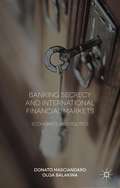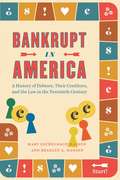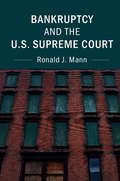- Table View
- List View
Banking Law and Financial Regulation in Pakistan: The Role of Lender of Last Resort
by Muhammad Hassan IdreesThis book offers an analysis of the contemporary significance of the practice of Lender of Last Resort (LOLR) in Pakistan. Aiming to identify deficiencies in current financial system legislation, the book details the role of LOLR and its essential presence in establishing a resilient banking and financial system.Beginning with an assessment of the emergence of Central Banks as domestic financial regulators, the book draws from the principles of Walter Bagehot and Henry Thornton for LOLR rescue operations. Examining the International Monetary Fund’s (IMF) role as an international lender of last resort and scrutinising its rescue efforts, the book uses case studies of the Central Banks in the United Kingdom and the United States to suggest reforms for Pakistan’s system. It explores the causes of financial crises and evaluates the factors that have made LOLR an integral part of Central Banks’ responsibilities. It compares LOLR operations in the cases of AIG and Lehman Brothers in the United States and Northern Rock in the United Kingdom, comparing these two cases in Pakistan to pinpoint key gaps in the State Bank of Pakistan’s LOLR operations. Furthermore, it discusses the Basel Accord I, II, and III: the key international regulations for the banking sector.The book will be of interest to scholars and students in the field of financial and banking law.
Banking Law and Financial Regulation in the UK and EU: Technology, Human Rights and Crises
by Pierre de Gioia Carabellese Camilla Della GiustinaBanking Law and Financial Regulation in the UK and EU seeks to blend orthodox topics covered within the banking and financial law syllabus, such as sources of banking and financial law, financial markets, financial and banking institutions, financial transactions, and banking and financial insolvency, with a careful analysis of emerging issues and more contemporary topics.This advanced-level textbook offers a new format for the study of banking and financial law, placing it within the wider context of economic development. As such, two elements are integral to this new methodology: the rise of techno-banking and digitalisation of the financial sector, and Brexit. Departing from the approaches of more traditional textbooks in this area, the book also takes a comparative approach to UK and EU banking law, highlighting the legal consequences of the UK’s exit from the EU. Aspects of human rights are integrated throughout and current debates and developments around financial crises – the advancement of technological innovations in the banking sector and contemporary topics, such as health crises, energy, and ESG and the environment – is taken into account to provide the reader with the opportunity to develop their own autonomous and broader understanding of the various concepts.Banking Law and Financial Regulation in the UK and EU will be a valuable text for students taking advanced undergraduate and postgraduate-level courses in banking law and financial law, as well as practising lawyers, managers and accountants.
Banking Law and Practice
by The Hong Kong Institute of BankersA solid understanding of how banks operate is crucial to grasp the functioning of modern society. Banks are an intrinsic part of business, finance, and everyday life. Modern banking is regulated by a sophisticated set of laws and regulations that are constantly evolving. Banking Law and Practice from the Hong Kong Institute of Bankers outlines and explains these laws and regulations clearly and in detail. This regulatory framework has a deep impact on banks, bankers, and anyone that deals with them, which is the overwhelming majority of society. This high level of impact makes Banking Law and Practice an important book as well as a necessary and authoritative reference for industry professionals, students, and the public at large. Banking Law and Practice discusses a range of topics that have a direct bearing on the day-to-day operations of banks, from contracts to how to ensure safe and secure lending. It examines the development and current state of banking legislation and regulation and facilitates bankers and their institutions to shape their practice to meet all the necessary legal and regulatory requirements. Students, industry professionals, and the public at large will welcome the thorough and clear explanations of the legal and regulatory framework in which banks operate. This book is essential reading for candidates studying for the HKIB Associateship Examination and anyone else seeking expert knowledge of the legal and regulatory structure affecting banks in Hong Kong. Topics covered in this book include: Contractual Relationships Code of Banking Practice Money Laundering Negotiable Instruments Law Related to Securities Bankruptcy and Insolvency
Banking On It: How I Disrupted an Industry
by Anne BodenONE WOMAN'S QUEST TO REBUILD BRITAIN'S BROKEN BANKING SYSTEM'If there was ever a business book suitable for TV adaptation, this is it' FTIn the aftermath of the 2008 financial crash, the British banking industry had come to a standstill. Trust in the sector had been left in tatters and, despite the emergence of technologies which could revolutionise the customer experience, nobody wanted to upset the status quo.That was until Anne Boden decided to do something radical and start her own bank.Founder of Starling Bank, winner of Best British Bank three years running, in this awe-inspiring story Anne reveals how she broke through bureaucracy, successfully tackled prejudice to realise her vision for the future of consumer banking and revolutionised the entire industry forever.***ONE OF THE TIMES TOP 5 BEST BUSINESS BOOKS OF THE YEAR 2020***'A banking blockbuster' The Observer Magazine'Sent shockwaves through the tight-knit world of UK tech and venture capital' Yahoo Finance
Banking Reforms in Africa: Implications for Economic Welfare and Poverty Reduction (Routledge International Studies in Money and Banking)
by Agnes Olatokunbo MartinsThis book comprehensively explores the intricate relationship between banking reforms, economic well-being, and poverty reduction across the African continent. Delving into the historical roots of banking reforms, it examines the resilience of banking sectors in key African countries like South Africa, Nigeria, Kenya, MENA, and beyond.The findings suggest that much attention should be paid to the design of banking systems and how banks are regulated. This focus on banks differs from many discussions on the topic, which tend to be more concerned with other policy areas such as economic policy, international trade policy, and aid. The book’s extensive and contemporary overview of banking reforms enables a comparative analysis of regulatory frameworks, supervision practices, and government interventions. It evaluates theoretical frameworks linking banking reforms to bank stability and resilience, drawing on financial intermediation, resource allocation, systemic risk, and financial development concepts. It empirically tests the causal relationships between the Basel II/III capital reforms, bank sector resilience, economic growth, and poverty reduction and identifies and analyses the channels and mechanisms through which banking reforms affect economic welfare and poverty reduction in Africa, such as credit availability, financial efficiency, financial innovation, and financial access.The book offers an insightful exploration into a brighter economic future on the African continent. The findings presented herein offer valuable insights for policymakers, researchers, and practitioners striving to enhance financial stability, foster economic growth, and alleviate poverty in Africa.
Banking Regulation in Africa: The Case of Nigeria and Other Emerging Economies (Routledge Research in Finance and Banking Law)
by Folashade AdeyemoThere is scarce literature on the development of banking regulation in Nigeria, or the scope of powers of the Central Bank of Nigeria, which is its core banking sector regulator. The critical impetus of this book is to contribute to the literature of this area, with a detailed exploration of the Nigerian regulatory architecture. In addition, the book also engages in a comparative analysis with two emerging economies in Africa: South Africa and Kenya. It also considers the UK and the US as comparator jurisdictions in light of their regulatory responses to the global financial crisis of 2008. This book contributes to the ongoing discourse in this area by exploring, in detail, the theoretical underpinnings of regulation and supervision, to determine whether there is an understanding of what constitutes effective regulation in these jurisdictions. Given that Nigeria is the core jurisdictional focus, a historical account of banking exchanges from the pre-colonial era to more recent times is provided. Offering an understanding of how political, local and economic settings, in conjunction with the theories of regulation have impacted and influenced regulatory development in Nigeria, the book engages in an examination of Nigeria’s historical experiences with bank failures, including the banking crisis it experienced in 2008. The newly enacted Banks and Other Financial Institutions Act 2020 is also explored as part of this discourse. Through a critical analysis of the law, the book demonstrates that the Nigerian regulator has historically adopted a reactionary strategy, instead of a proactive and pragmatic approach, which is imperative for an effective regulatory regime. The outcome of this analysis is that there are lessons to be learned, and proposals are discussed in order to rethink the act of banking regulation.
Banking Regulation In China
by He Wei PingBanking Regulation in China provides an in-depth analysis of the country's contemporary banking regulatory system, focusing on regulation in practice. By drawing on public and private interest theories relating to bank regulation, He argues that controlled development of the banking sector transformed China's banks into more market-oriented institutions and increased public sector growth. This work proves that bank regulation is the primary means through which the Chinese government achieves its political and economic objectives rather than using it as a vehicle for maintaining efficient financial markets.
Banking Regulation of UK and US Financial Markets
by Dalvinder SinghDalvinder Singh provides an interdisciplinary analysis of the legal aspects of prudential supervision. This gives the reader a broader understanding of the core processes of banking supervision. By using the UK as a case study, a comparison is made with the US to illustrate the different ways of approaching the issues. The author examines the legal as well as the theoretical, economic, political and policy issues that underpin the purpose of prudential supervision, such as corporate governance, enforcement sanctions, the role of external auditors and accountability of financial regulators. These are considered in the context of broad-policy considerations which render prudential supervision necessary, namely financial stability and depositor protection. The book will be of interest to academics, policymakers, regulators and practitioners, and equally will serve specialist undergraduate and postgraduate programmes in law, management and economics which focus on financial regulation.
Banking Secrecy and Global Finance: Economic And Political Issues
by Donato Masciandaro Olga BalakinaA 2009 G20 official document stated that the era of banking secrecy is over but is it? If banking secrecy is the result of market mechanisms, it suggests that worldwide demand and supply are likely to remain for a long time to come. Since the Global Financial Crisis, many countries have fought to combat banking secrecy, yet it permeates both national and international industries, and global efforts to prevent banking secrecy have been ineffective or at worst counterproductive. In this book, the authors show how the growth of criminal activity has systematically generated a demand for banking secrecy. They explore how national politicians and international banks have been motivated to supply banking secrecy through economic and political incentives, and shed light on the economics and politics of banking secrecy. This book takes a multidisciplinary approach to reveal the variety of behaviours and processes involved in making dirty money appear clean, providing an in-depth study of financial transactions which are characterized by a special purpose: hiding the originally illegal sources. This work will be of interest to students and scholars of economics and finance, and those with an interest in banking secrecy, global finance, international banking, and financial regulation.
Banking Secrecy and Offshore Financial Centers: Money laundering and offshore banking (Routledge Research in Finance and Banking Law)
by Mary Alice YoungThis book brings together the issues surrounding banking secrecy and confiscation of criminal proceeds. The book examines the existing legal agreements at the international, regional and national levels and their interaction in the substantive areas of confiscation, anti-money laundering and banking confidentiality laws. It looks at how these agreements have been applied in offshore financial centers and demonstrates that despite a number of legally binding UN Conventions as well as global anti-money laundering recommendations, the implementation of them is often lukewarm by those Parties who have ratified the Convention and adopted obligations, because of this the confiscation legislation is incompatible with strict banking confidentiality laws. The work draws on the experience of criminologists to offer critical insight into the legislative frameworks designed to deal with banking secrecy and confiscation in offshore financial centers. It goes on to offer suggestions for measures that may be taken by major economies to circumvent the lack of cooperation by offshore financial centers as intolerance towards money laundering grows in light of recent political and economic events. This book will be of particular interest to students and scholars of Law, Finance and Criminology.
Banking Supervision and Criminal Investigation: Comparing the EU and US Experiences (Comparative, European and International Criminal Justice #1)
by Giulia LasagniIn the aftermath of the last financial crisis, on both sides of the Atlantic banking supervisors were given new supervisory and enforcement powers, which are often of a substantially punitive-criminal nature. In Europe in particular, the establishment of the Single Supervisory Mechanism within the European Central Bank substantially increased centralised investigatory and sanctioning powers. This major innovation, together with the development of forms of real-time monitoring of banking (often digital) records, challenges traditional banking criminal investigations in their national-based and analogue dimension.The book offers a comprehensive account and perspective analysis of the interactions between the criminal and administrative nature of such new powers, highlighting their “punitive” overall nature and their impact on fundamental rights. Covering both the US and the EU regulatory frameworks, it presents unprecedented, trans-systemic research between criminal law and procedure, and between regulatory and administrative law, at the international, European and national level.The book also includes a rich and detailed selection of case law from the US and the European supreme courts, with a specific focus on CJEU and ECtHR decisions.
Bankrotmaking van die Derde Wêreld
by Elmarié Smal James Morcan Lance MorcanBankrotmaking van die Derde Wêreld is toegewy aan die armes in vergete plekke van die wêreld. Dit vra of die Wêreldbank, die Internasionale Monetêre Fonds, die Verenigde State se Agentskap vir Internasionale Ontwikkeling en ander groot internasionale hulporganisasies die wêreld se armste mense help of belemmer. In hierdie boek word ook gevra of die hulppakkette wat verskaf word, reg is en of dit swendelary is wat ontwerp is om Derde Wêreldlande te onderwerp. Dit stel die kultuur van korrupsie binne die voorgenoemde hulporganisasies bloot en die arrogansie waarmee hulle hul derde wêreldkliënte behandel. ' Die Morcans onthul dat daar 'n onheilspellende verborge agenda is waarvolgens die 'vrygewigheid' wat deur internasionale hulporganisasies uitgebrei word om die ontwikkeling van die Derde Wêreld te ondersteun en om verligting te bied in die geval van natuurrampe, met ernstige bymotiewe kom. Bymotiewe wat ontwerp is om kwesbare nasies te kul. Die leser word herinner aan die ekonomiese treffers wat gewild geword het in John Perkins se topverkoper van 2004. Bekentenisse van 'n Ekonomiese Sluipmoordenaar is nog steeds lewendig en goed - in Afrika in die besonder. By die skryf van hierdie boek is die skrywers gemotiveer deur een sieklike statistiek: 21, 000 mense sterf elke dag van hongersnood. Dit is een persoon elke vier sekondes! Meer siek is die feit dat sulke sterftes onnodig is aangesien daar meer as genoeg rykdom in die wêreld is, want almal moet ten minste die basiese lewensbehoeftes ontvang en daar is meer as genoeg in die Derde Wêreld om dit self organies te onderhou. Teen die tyd dat jy aan die einde van hierdie boek kom, sal jy sien dat daar soveel rykdom in die Derde Wêreld voorkom soos in die Eerste Wêreld. Trouens, terme soos 'Derde Wêreld' en 'verarmde nasies' is in wese verkeerde benamings, omdat dit impliseer dat rykdom en hulpbronne beperk is.
Bankrupt
by Bruce G. Carruthers Terence C. HallidayThe Asian Financial Crisis dramatically illustrated the vulnerability of financial markets in emerging, transitional, and advanced economies. In response, international organizations insisted that legal reforms could help protect markets from financial breakdowns. Sitting at the nexus between the legal system and the market, corporate bankruptcy law ensures that the casualties of capitalism are treated in an orderly way. Halliday and Carruthers show how global actors-including the IMF, World Bank, UN, and international professional associations-developed comprehensive norms for corporate bankruptcy laws and how national policymakers responded in turn. Drawing on extensive fieldwork in China, Indonesia and Korea, the authors reveal how national policymakers contested and negotiated domestic laws in the context of global pressures. The first study of its kind, this book offers a theory of legal change to explain why global/local tensions produce implementation gaps. Through its analysis of globalization, this book has lessons for international organizations and developing and transition economies the world over.
Bankrupt in America: A History of Debtors, Their Creditors, and the Law in the Twentieth Century (Markets and Governments in Economic History)
by Mary Eschelbach Hansen Bradley A. HansenIn 2005, more than two million Americans—six out of every 1,000 people—filed for bankruptcy. Though personal bankruptcy rates have since stabilized, bankruptcy remains an important tool for the relief of financially distressed households. In Bankrupt in America, Mary and Brad Hansen offer a vital perspective on the history of bankruptcy in America, beginning with the first lasting federal bankruptcy law enacted in 1898. Interweaving careful legal history and rigorous economic analysis, Bankrupt in America is the first work to trace how bankruptcy was transformed from an intermittently used constitutional provision, to an indispensable tool for business, to a central element of the social safety net for ordinary Americans. To do this, the authors track federal bankruptcy law, as well as related state and federal laws, examining the interaction between changes in the laws and changes in how people in each state used the bankruptcy law. In this thorough investigation, Hansen and Hansen reach novel conclusions about the causes and consequences of bankruptcy, adding nuance to the discussion of the relationship between bankruptcy rates and economic performance.
Bankruptcy: The Case for Relief in an Economy of Debt (International Corporate Law and Financial Market Regulation)
by Joseph SpoonerA decade after the Global Financial Crisis and Great Recession, developed economies continue to struggle under excessive household debt. While exacerbating inequality and political unrest, this debt - when combined with wage stagnation and a shrinking welfare state - has played a key role in maintaining economic growth and allowing households faced with rising costs of living to make ends meet. In Bankruptcy: The Case for Relief in an Economy of Debt, Joseph Spooner examines this economic model and finds it increasingly unsustainable. In a call to action to reduce debt burden, he turns to bankruptcy law, which is uniquely situated as a mechanism of social insurance against the risks of a debt-dependent economy. This book should be read by anyone interested in understanding the problem of consumer debt and how best to address it.
Bankruptcy and the U.S. Supreme Court
by Ronald J. MannIn this illuminating work, Ronald J. Mann offers readers a comprehensive study of bankruptcy cases in the Supreme Court of the United States. He provides detailed case studies based on the Justices' private papers on the most closely divided cases, statistical analysis of variation among the Justices in their votes for and against effective bankruptcy relief, and new information about the appearance in opinions of citations taken from party and amici briefs. By focusing on cases that have neither a clear answer under the statute nor important policy constraints, the book unveils the decision-making process of the Justices themselves - what they do when they are left to their own devices. It should be read by anyone interested not only in the jurisprudence of bankruptcy, but also in the inner workings of the Supreme Court.
Bankruptcy Courts & Procedures
by Pamela Everett NollkamperBankruptcy Courts & Procedures is a comprehensive guide to the entire bankruptcy process, including involuntary, creditor and adversary proceedings. The book also lists fees, filing requirements, names, addresses and telephone numbers for every bankruptcy court in the nation. Written by Pamela Everett Nollkamper, a professional paralegal with decades of experience, Bankruptcy Courts & Procedures provides the tools necessary to guide you through your case whether you're new to the field or an experienced bankruptcy professional. Bankruptcy Courts & Procedures provides information necessary to file in every bankruptcy court nationwide, with filing requirements for all 50 states, the District of Columbia, Puerto Rico and the Virgin Islands.
Bankrupts and Usurers of Imperial Russia
by Sergei AntonovAs readers of Russian literature know, the nineteenth century was a time of pervasive financial anxiety. Russians of all classes were enmeshed in networks of credit and debt, and borrowing and lending shaped perceptions of material and moral worth. Sergei Antonov recreates this imperial world of borrowers, bankrupts, lenders, and loan sharks.
Banks: Fraud And Crime (International Banking, Finance And Economic Law Series Set Ser.)
by Joseph J. Norton George A. WalkerBanks: Fraud and Crime explores the main issues which arise in bank fraud world-wide and looks at the possible options available for corrective action. A series of leading commentators examine the basic nature of bank fraud and financial crime, comparing the legal and regulatory framework in England to those in place in the USA and elsewhere. Banks: Fraud and Crime also takes a detailed look at the core issue of money laundering at a national, regional and international level as well as considering the many other complex issues arising from bank fraud and financial crime.
Banks and Labor as Stakeholders: Impact on Economic Performance
by Stijn Claessens Kenichi UedaA report from the International Monetary Fund.
Banks and Remedies
by William Blair QcThis text looks at the options that the law provides, both domestically and internationally. It also explains the various opportunities available to reduce risk and organize and administer rescue packages for ailing institutions. This edition addresses the new civil procedures rules in England; arbitration in banking and finance; rescues; EC remedies and English law remedies.
Banks in Crisis: The Legal Response (Routledge Revivals)
by Andrew Campbell Peter CartwrightThis title was first published in 2002: A detailed and critical analysis of the various legal problems that arise when banks are in serious financial difficulty, Banks in Crisis offers an invaluable, international perspective on the concept and causes of bank failure. It takes an authoritative and much-needed look at a number of key issues including: - Effective bank regulation as an instrument in the possible prevention of banking crises, with particular reference to the role of the Financial Services Authority in the UK, and the impact of the Financial Services and Markets Act 2000 - The role of the Bank of England in the new regulatory landscape, with particular reference to its function as lender of last resort - The legal controls on those involved in the management of banks - Insolvency procedures and bank liquidation - The use of depositor protection schemes. By drawing conclusions and weighing up the methods available to promote stability, prevent failure and promote rescues where appropriate, Banks in Crisis is an essential read and a welcome addition to this crucial area of research.
Banks, Liability and Risk
by William Blair QcBanks, Liability and Risk, 3rd Edition, is a probing look at the risks faced by banks and other lending institutions, showing problems typically faced by these institutions and highlighting the legal remedies available, with copious references to case law and precedents. The nature of the risks and liabilities which banks are exposed to are continually changing. This new edition has been completely revised to incorporate these changes, so that you can provide your clients and colleagues with the most up-to-date advice.
Bankster$ Internacionais
by James Morcan Lance Morcan Wesley LindquistBankster$ Internacionais identifica quem são os responsáveis pelos gigantescos golpes financeiros que separam os 1% superiores da população, quanto à renda, das pessoas comuns, ou os 99%. Os Barões do Dinheiro focalizados neste livro incluem os administradores dos mais altos níveis nos bancos de Wall Street, nos bancos centrais europeus, na Reserva Federal dos EUA e no Banco do Vaticano, bem como os membros das dinastias bancárias de elite, por exemplo as famílias Rothschild e Rockefeller. Bankster$ Internacionais revela os verdadeiros motivos da série de crises financeiras recentes. Esses motivos incluem: o mundo secreto do "black money" e do dinheiro do Velho Mundo onde a maioria dos ativos e renda permanece não declarada; o sistema dos bancos centrais e a verdadeira natureza da Reserva Federal, dos EUA; as atividades financeiras menos do que santas do Vaticano; as relações nem sempre benevolentes do FMI e do Banco Mundial com os países do Terceiro Mundo; as medidas de austeridade atualmente infligidas a nações vulneráveis como a Grécia; bem como a teoria de que o suprimento de dinheiro do mundo está essencialmente sendo criado do nada. Além de identificar problemas e expor a corrupção, Bankster$ Internacionais propõe ideias para criar um sistema econômico mais justo. Essas idéias incluem: criar bancos públicos; utilizar certos aspectos da banca islâmica que podem ser compatíveis com os sistemas bancários ocidentais; estudar se o capitalismo e o socialismo podem realmente funcionar em conjunto; discutir o caso de manter, mas reestruturar o capitalismo; considerar os méritos de uma renda universal; e prever a influência do ciber-dinheiro, ou criptomoedas, na economia mundial nos próximos anos. Embora os assuntos abordados possam ser problemas monetários, isso está na superfície ...
Banned: The Fight for Mexican American Studies in the Streets and in the Courts
by Nolan L. Cabrera Robert S. ChangIn Banned, readers are taken on a journey through the intense racial politics surrounding the banning of Mexican American Studies in Tucson, Arizona. This book details the state-sponsored racism that led to the elimination of this highly successful program, and the grassroots and legal resistance that followed. Through extensive research and firsthand narratives, readers will gain a deep understanding of the controversy surrounding this historic case. The legal challenge successfully overturned the Arizona law and became a central symbol in the modern-day Ethnic Studies renaissance. This work is a must-read for anyone interested in understanding the power of community activism, the importance of fighting for educational equity, and why the example of Tucson created an alternative blueprint for how we can challenge states that are currently banning critical race theory.


